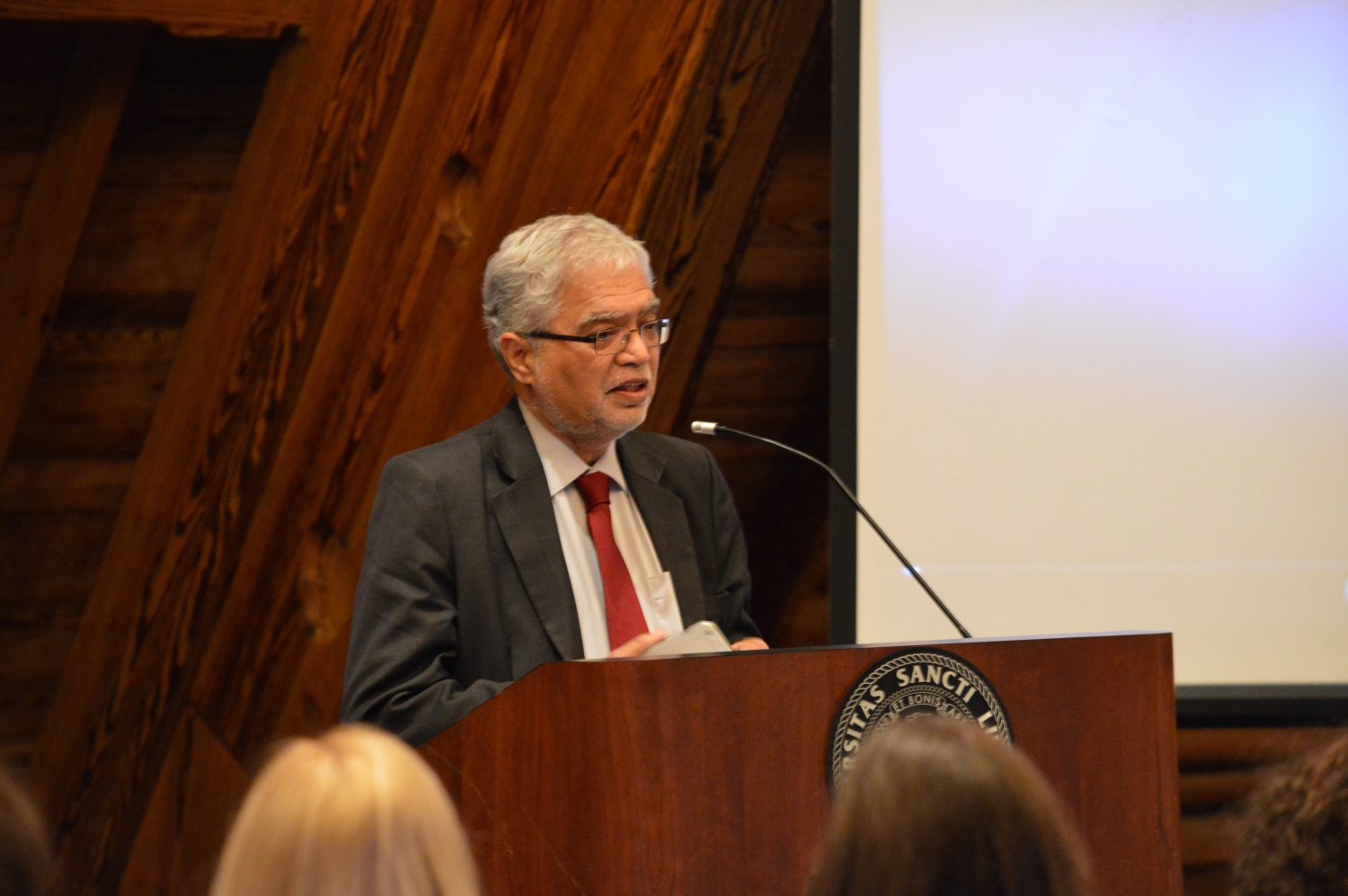“What I want you to do is come with me on a journey … I want you to imagine that you are me … and you have just been appointed to be the head of the United Nations in a country called Sudan.” So began Dr. Mukesh Kapila, softly yet confidently commencing his address for the 2016 ATLAS Distinguished Guest Lecture, where he detailed his story of witnessing and working to stop a genocide.
Born in India, but later moving to Britain, Kapila began his professional career in medicine and public health. From there, he ventured into the world of international politics and humanitarian aid, a world which would cross his path with that of mass murderers, victims and humanitarian heroes alike.
Kapila now has experience in over 130 countries in senior positions with the British government, the United Nations (UN), World Health Organization and International Federation of Red Cross and Red Crescent Societies. It was his experiences running the UN mission in Sudan in 2003 and 2004, during the genocide in Darfur, that captivated his audience at the Sinquefield Stateroom the evening of April 6.
In terms of guest speakers at SLU, Kapila’s speech was incredibly interactive, with the former UN chief frequently asking audience members “what would you do next?” Far from being a childish or superficial “choose your own adventure” story, Kapila’s tale symbolically brought those attending with him back to his large office in Sudan’s capital, Khartoum, where he personally learned of and reacted to the ethnic killings of Darfur’s non-Arabs.
Upon beginning work in Sudan, Kapila tells the audience, “Roger (a Canadian mounted police officer serving as his UN chief of security) tells you about a place called Sudan … you say to Roger, keep me informed.” Frequent updates lead Kapila to learn about a coordinated and escalating pattern of violence being enacted upon larger and larger numbers of citizens.
Eventually, Kapila realized he would have to go witness these developments for himself. “You’ve easily figured out in one trip that what you’re getting is ethnic violence against one group, because of their identities.”
A simple plane ride over a scatter plot of burning villages – with buildings, farms, everything on fire – told him enough to know that he was dealing with more than random acts of violence. As the sun faded over St. Louis in the windows behind him, Kapila’s story took darker and darker turns.
Kapila gave the crowd their first lesson on recognizing coordinated and planned violence. “Normal traditional violence is self limiting…If you want to conquer land, you leave it in such a state that you can utilize it after your victory. This (was) clearly a war of destruction.”
As the government continued to feed him lines of dismissal – “the current drought is causing violence” – Kapila turned to his bosses with the United Nations, particularly the then-Secretary General Kofi Annan. He waited for a response. And waited. And waited.
Lightening the mood, Kapila brought the story down to a simple family analogy. “When you write letters to your Uncle Kofi again and again in Alaska, and never hear back, you begin to worry about him.” Like any good “relative” would, Kapila left for the UN headquarters in New York. Importantly, though, he made a few stops along the way.
Thanks to his senior experiences with the British Government and UN, Kapila had high-level security clearances with MI6, the British intelligence agency. Stopping through Britain en route to the UN, Kapila learned that one really can see individual hairs on people’s heads from satellite cameras.
He also learned that he could read individual license plates on cars and numbers on warplanes, including ones that were dropping bombs on villages in Darfur. It was there he confirmed that the government of Sudan was behind the attacks against its own people.
Even with American intelligence confirming these new findings, he was unable to stir any action with his visit to the UN headquarters. He was told to stay within his mandate – delivering aid.
Making a fuss over Darfur might derail the greater political progress towards a separate north-south truce in Sudan’s larger political conflict. Darfur might have to be the sacrifice made for a greater good.
Not accepting this for an answer, Kapila decided to share all of his information with BBC International. He gave a tell-all interview in the early morning, the dead of night back in New York, where Annan was soundly sleeping. Kapila filled his day with multiple interviews to international news outlets, ensuring that the UN in New York would awake to enough attention that they would be forced to act.
Their response, finally, was one of their fastest ever.
Kapila ended his somber story with the lessons he learned, and with lessons he wanted to instill upon those present. “Is it right to sacrifice a bunch of people here for the greater good there?” He astutely noted that no one from the UN asked the Darfuris if they minded being sacrificed for the greater political solution.
Taking a clear aim of the higher-ups of the UN New York bureaucracy, especially Annan, Kapila talked about office space for lesson two. “People with the most important job often get the office on the highest floor.” From that high up, people on the sidewalk, the real world, often look like ants. He likened this to comments about victims in Rwanda being called “cockroaches” or those in Sudan being compared to “black garbage bags.”
He ended his night with a note on platforms. “No one listened to me because I was Mukesh Kapila. They listened because I carried the platform of the top of the UN in Sudan. What platform do you carry?” While those in attendance may never have to look genocide in the eye, he challenged all to think about how they can use their platforms to speak out about an issue – no matter how large or small – and make a difference.






